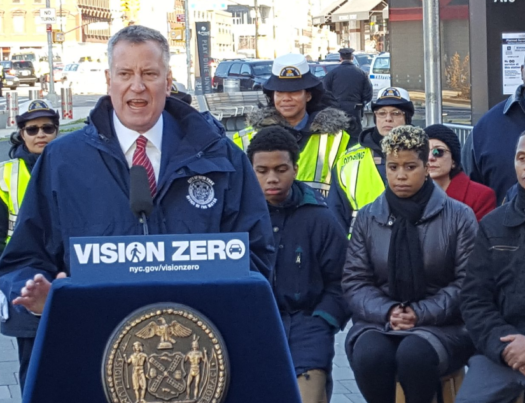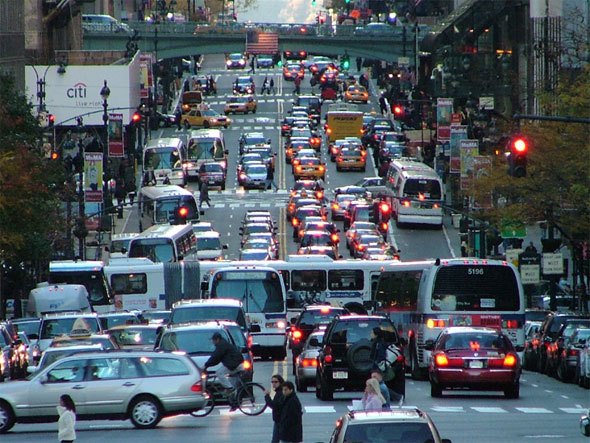Responding on WNYC this morning to a Staten Island motorist frustrated with the "hour-and-a-half to two hours" it takes for him to get from Greenpoint to Staten Island, Mayor de Blasio announced that the city will release a "bigger plan to address congestion" in the "coming weeks."

"I know very well that there’s a huge congestion problem on Staten Island -- and certainly as the borough has grown, it’s gotten worse -- and we have seen a huge congestion problem in other parts of the city, most notoriously Midtown Manhattan," he said.
The mayor declined to go into details, so we'll have to wait and see what City Hall has in mind. The most comprehensive congestion-fighting proposal on the table right now is the Move NY toll reform plan, but that needs approval from Governor Cuomo and the state legislature to advance.
Still, the mayor has options at his disposal. Policies like HOV restrictions on bridges, dynamic pricing of curbside parking, and, if he really wants to pick a fight, placard reform, could all yield immediate traffic reduction benefits. Long-term, City Hall could do a lot more to cut traffic by eliminating parking requirements throughout the city.
The half-hour "Ask the Mayor" segment on the Brian Lehrer show touched on a number of other transportation topics, including de Blasio's decision to leave discounted MTA fares for low-income residents out of his preliminary budget.
"I was disappointed, I have to say, because I know that you're a champion for income inequality and for low-income people and helping them get ahead," one caller said.
The mayor defended the decision, repeating two points he made earlier in the week: first, that the MTA is the state's responsibility, and second, that the city needs to be careful about its spending now that Republicans control Washington.
"With the federal government and the state government constantly forcing obligations onto the city that really should be federal and state obligations, it's very worrisome to me to say we're going to pick up something that really should be a state responsibility," de Blasio said. "They control the MTA, they have resources. Every time the city picks up a new expense that should be picked up by the state, that worries me for the future."
That's a sensible point, especially since Governor Cuomo has a history of raiding MTA funds and failing to follow through on his promises to support the transit system.
But it's still hard to square the mayor's refusal to fund discount transit fares with his support for projects like citywide ferry service and the $2.5 billion BQX streetcar, both of which cost a lot in relation to the number of people they'll serve. The ferries cost much more to subsidize per ride than subway and bus trips, but serve more affluent areas of the city.
Ferries are “a work in progress but one I want to move very aggressively," de Blasio said, "because I understand people are frustrated, they need more transportation options. The MTA does very important work, but they’re not going to do these sorts of things.”
At the same time, de Blasio declined to support decriminalization of fare-beating, one of the most common NYPD summonses, which punishes poor New Yorkers who cannot afford transit fares. Council Member Rory Lancman has asked de Blasio to make fare evasion a civil offense, much like a parking ticket, as opposed to a criminal violation.
Lancman said decriminalization would protect immigrants who might get swept up by the Trump administration, because the city does refer undocumented residents with criminal records to federal immigration officials. Fare-beating is not one of the 170 criminal offenses trigger a referral, however.
Turnstile-jumping is “a problem unto itself,” de Blasio said, arguing that “when police have stopped someone for that, they have found other problems.” He said he was open to ending arrests for the offense, but not as a matter of responding to federal immigration crackdowns.
“That’s its own discussion that should be about what keeps us safe in New York City, not because we fear an executive order that on its face we believe is legally contradictory,” de Blasio said.






